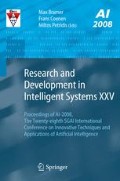Abstract
In this paper, we provide a model of corrective feedback generation for an intelligent tutoring system for Spanish as a Foreign Language. We have studied two kind of strategies: ( 1) Giving-Answer Strategies (GAS), where the teacher directly gives the desired target form or indicates the location of the error, and (2) Prompting-Answer Strategies (PAS), where the teacher pushes the student less directly to notice and repair their own error. Based on different experimental settings and comparisons with face-to-face tutoring mode, we propose the design of a component of effective teaching strategies into ITS for Spanish as a foreign language.
This research is sponsored by the National Council for Scientific and Technological Research (FONDECYT, Chile) under grant number 1080165 “A Blended Learning Task-based Modeland Cooperative Approaches for Teaching Spanish as Foreign Language”
Access this chapter
Tax calculation will be finalised at checkout
Purchases are for personal use only
Preview
Unable to display preview. Download preview PDF.
References
V. Aleven, Popescu, and O. Ogan. A formative classroom evaluation of a tutorial dialogue system that supports self-explanation. In V. Aleven, editor, Procs. of the 11th Int. Conf. on Artificial Intelligence in Education, pages 345–355, 2003.
J. Anderson, A. Corbett, K. Koedinger, and R. Pelletier. Cognitive Tutors: Lessons Learned. Journal of the Learning Sciences, 4(2): 167–207, 1995.
Michelene T. H. Chi, Stefanie Siler, H. Jeong, T. Yamauchi, and Robert G. Hausmann. Learning from human tutoring. Cognitive Science, 25(4):471–533, 2001.
M. Dodigovic. Artificial Intelligence in second Language Learning: Raising Error Awareness. Multilingual Matters, 2005.
C. Doughty and E. Varela. Communicative focus on form. In C. Doughty and J. Williams, editors, Focus on Form in classroom second language acquisition, pages 114–138. Cambridge University Press, 1998.
A. Ferreira. Estrategias efectivas de feedback correctivo para el aprendizaje de lenguas asistido por computadores. Revista Signos, 40(65):521–544, 2007.
A. Ferreira, J. Moore, and C. Mellish. A Study of Feedback Strategies in Foreign Language Classrooms and Tutorials with Implications for Intelligent Computer Assisted Language Learning Systems. International Journal of Artificial Intelligence in Education, 17(4):389–422, 2007.
A.C. Graesser, S. Lu, G.T. Jackson, H. Mitchell, M. Ventura, A. Olney, and M.M. Louwerse. Autotutor: A tutor with dialogue in natural language. Behavioral Research Methods, Instruments, and Computers, 36:180–193, 2004.
T. Heift and M. Schulze. Errors and Intelligence in Computer-Assisted Language Learning: Parsers and Pedagogues. Routledge, 2007.
G. Hume, J. Michael, A. Rovick, and M. Evens. Hinting as tactic in one-on-one tutoring. Journal of Learning Sciences, 5(1):23–47, 1996.
M. Levy and G. Stockwell. CALL Dimensions: Options and issues in computer assisted Language Learning. Lawrence Erlbaum Associates, London, 2006.
P. Lightbown and N. Spada. How Languages are Learned. Oxford University Press, 1999.
R. Lyster. Differential effects of prompts and recasts in form-focused instruction. Studies in Second Language Acquisition, 26(4):399–432, 2004.
R. Lyster and L. Ranta. Corrective Feedback and Learner Uptake: Negotiation of form in Communicative Classrooms. Studies in Second Language Acquisition, 19(1):37–66, 1997.
D. Merrill, B. Reiser, M. Ranney, and J. Trafton. Effective Tutoring Techniques: Comparison of Human tutors and Intelligent Tutoring Systems. Journal of the Learning Sciences, 2(3):277–305, 1992.
N. Nagata. Banzai: Computer assisted sentence production practice with intelligent feedback. Proceedings of the Third International Conference On Computer Assisted Systems for Teaching and Learning/Japanese (CASTEUJ), 2002.
E. Owen and K. Schultz. Empirical foundations for intelligent coaching systems. In Procs. of the Interservice/Industry Training, Simulation and Education Conference, Orlando, Florida, 2005.
C. P. Rosé, P. Jordan, and M. Ringenberg. Interactive conceptual tutoring in atlas-andes. In J. D. Moore, editor, AI in Education: AI-ED in the wired and wireless future, pages 256–266. IOS Press, 2001.
Author information
Authors and Affiliations
Editor information
Editors and Affiliations
Rights and permissions
Copyright information
© 2009 Springer-Verlag London Limited
About this paper
Cite this paper
Ferreira, A., Atkinson, J. (2009). Designing a Feedback Component of an Intelligent Tutoring System for Foreign Language. In: Bramer, M., Petridis, M., Coenen, F. (eds) Research and Development in Intelligent Systems XXV. SGAI 2008. Springer, London. https://doi.org/10.1007/978-1-84882-171-2_20
Download citation
DOI: https://doi.org/10.1007/978-1-84882-171-2_20
Publisher Name: Springer, London
Print ISBN: 978-1-84882-170-5
Online ISBN: 978-1-84882-171-2
eBook Packages: Computer ScienceComputer Science (R0)

